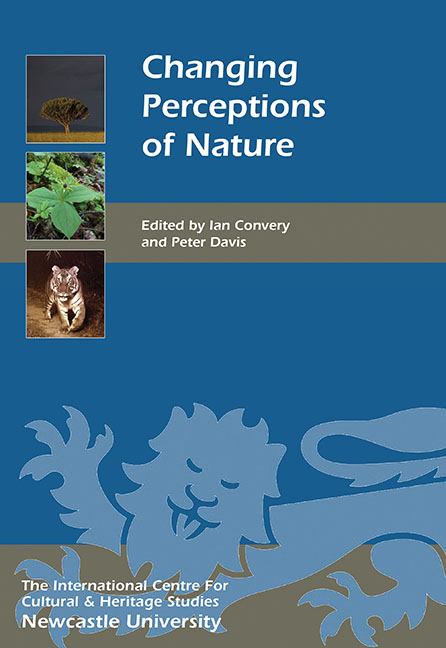Book contents
- Frontmatter
- Contents
- List of Illustrations
- Acknowledgments
- List of Abbreviations
- Foreword
- Introduction
- HISTORICAL PERSPECTIVES ON NATURE
- 1 ‘The Nomination of the Visible’: William Turner's Practice of Natural History
- 2 Early European Perceptions of the Nature of Australia
- 3 Conserving Natural Heritage: Shifting Positions of Culture and Nature
- 4 Three Birds of a Feather – Darwin, Wallace and Attenborough: An Unbroken Tradition of Finding Where the Wild Things Are
- 5 Organising, Naming and Ordering Nature
- 6 Our ‘Great Entail’: Constructing the Cultural Value of the Lake District
- COLLECTING NATURE
- INTERPRETING NATURE AND LANDSCAPES
- CONSERVING NATURE
- PEOPLE–NATURE INTERACTIONS
- List of Contributors
- Index
- Miscellaneous Endmatter
4 - Three Birds of a Feather – Darwin, Wallace and Attenborough: An Unbroken Tradition of Finding Where the Wild Things Are
from HISTORICAL PERSPECTIVES ON NATURE
Published online by Cambridge University Press: 26 October 2017
- Frontmatter
- Contents
- List of Illustrations
- Acknowledgments
- List of Abbreviations
- Foreword
- Introduction
- HISTORICAL PERSPECTIVES ON NATURE
- 1 ‘The Nomination of the Visible’: William Turner's Practice of Natural History
- 2 Early European Perceptions of the Nature of Australia
- 3 Conserving Natural Heritage: Shifting Positions of Culture and Nature
- 4 Three Birds of a Feather – Darwin, Wallace and Attenborough: An Unbroken Tradition of Finding Where the Wild Things Are
- 5 Organising, Naming and Ordering Nature
- 6 Our ‘Great Entail’: Constructing the Cultural Value of the Lake District
- COLLECTING NATURE
- INTERPRETING NATURE AND LANDSCAPES
- CONSERVING NATURE
- PEOPLE–NATURE INTERACTIONS
- List of Contributors
- Index
- Miscellaneous Endmatter
Summary
The natural world is the greatest source of excitement; the greatest source of visual beauty; and the greatest source of intellectual interest.
Sir David AttenboroughSIREN SONG OF THE TROPICS
Singly and collectively, three of Britain's greatest naturalists, Charles Darwin, Alfred Russel Wallace and – a century later – Sir David Attenborough, were all profoundly moved by wonder and awe in the midst of remote tropical forests. Those defining experiences helped to set the course of their lives as observers and explorers of the natural world and inspired their passion to understand and interpret it for the rest of us.
Darwin's initial exposure to a Brazilian rainforest, on 29 February 1832, evoked this ecstatic reaction in his diary:
The day has passed delightfully: delight is however a weak term for such transports of pleasure: I have been wandering by myself in a Brazilian forest: amongst the multitude it is hard to say what set of objects is most striking; the general luxuriance of the vegetation bears the victory, the elegance of the grasses, the novelty of the parasitical plants, the beauty of the flowers – the glossy green of the foliage, all tend to this end. … To a person fond of Natural history such a day as this brings with it pleasure more acute than he ever may again experience.
(Darwin 1839, transcribed in Keynes 1988, 42)Diverse life forms of the sea and shore equally amazed and delighted the 23-year-old naturalist, more than a quarter of a century before the publication of the Origin of Species: ‘Many of these creatures so low in the scale of nature are most exquisite in their forms & rich colours. – It creates a feeling of wonder that so much beauty should be apparently created for such little purpose’ (Keynes 1979, 22).
When Alfred Russel Wallace, an amateur naturalist fourteen years Darwin's junior, read Darwin's published travel journals, he was inspired to embark on his own odyssey of explora tion. Wallace's accounts of his twelve years as a field biologist and collector in Indonesia and the Amazon echo the same passionate, romantic enthusiasm of a naturalist's quest.
- Type
- Chapter
- Information
- Changing Perceptions of Nature , pp. 37 - 48Publisher: Boydell & BrewerPrint publication year: 2016



